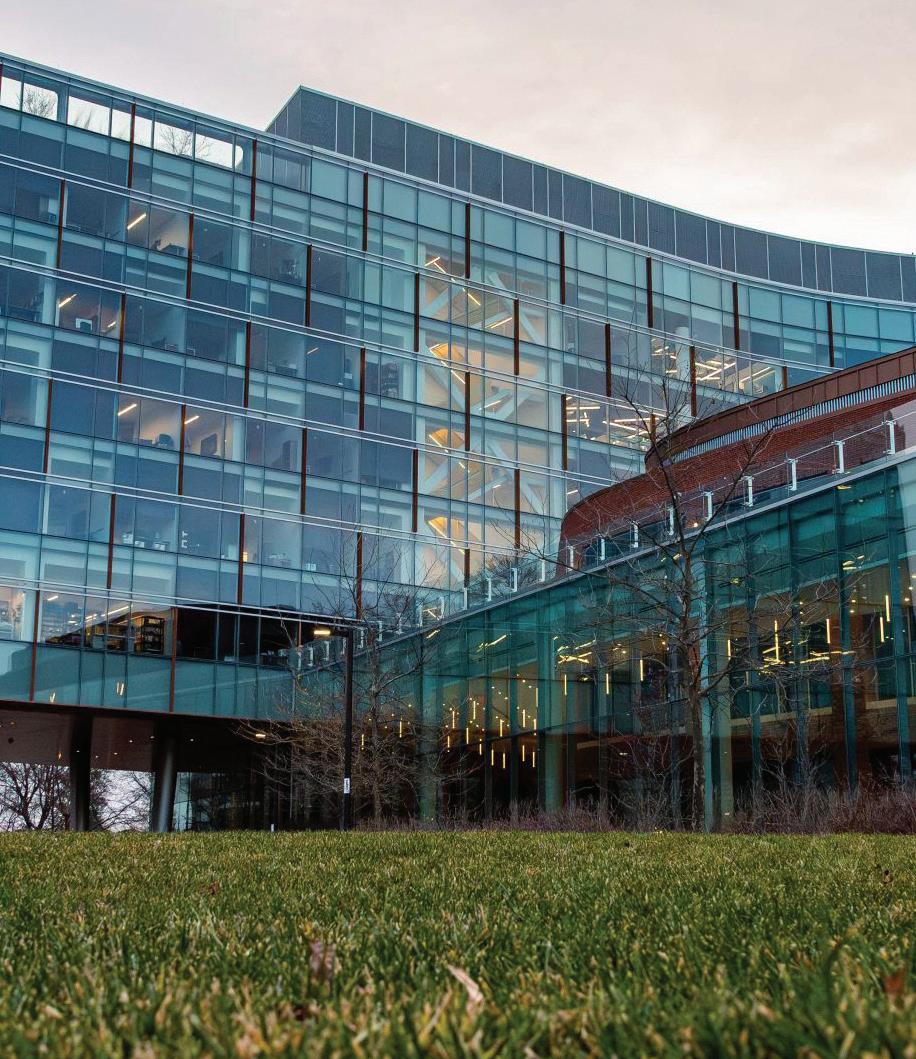










3
4
5
7




















3
4
5
7








Don’t waste your time on something not worth it -@krisluyue1013
Find an advisor who cares about your wellbeing. Grad life is 100x better if your advisor is supportive -@debankur.rivu
Sign a union card with GLU!! -@_dmgreene_
Time map your day!!! Google calendar is really good with that -@kingxlex
Housing is really expensive in CP and on-campus jobs are limited. Try to save money -@potato_0209
Have a roll graduate student as a mentor -@m.r.y.samadi2
What is one takeaway from your experience as a grad student at UMD?
It’s not easy, but the experience I’m getting is well worth it -@kingxlex
Have a goal for next two or ve years -@m.r.y.samadi2
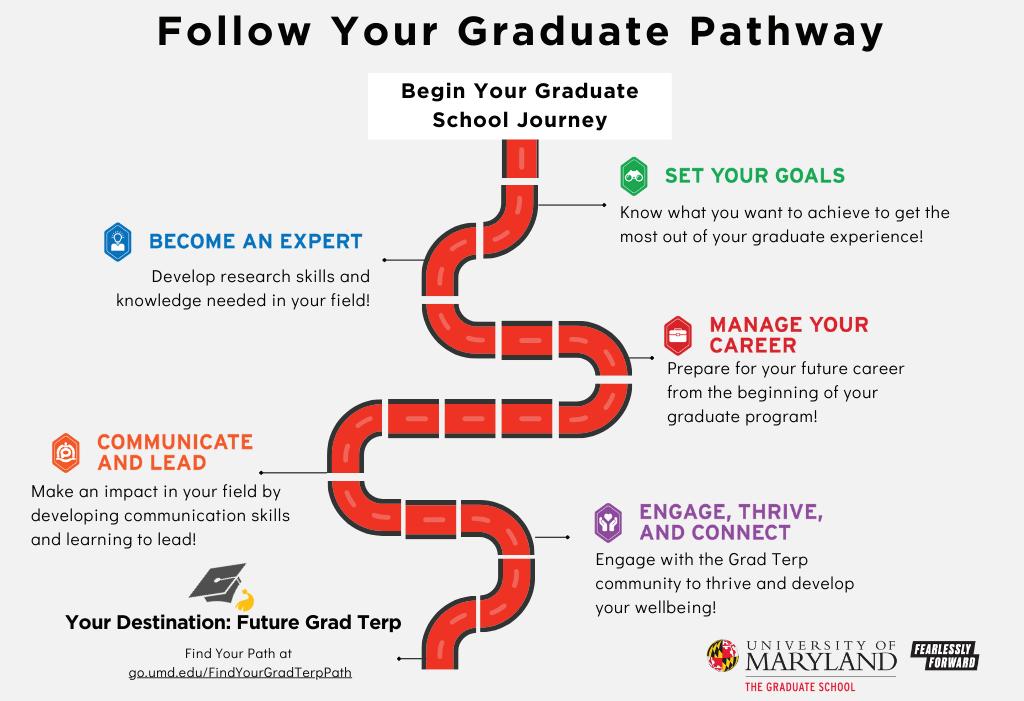 By Katharine Wilson | StaffWriter
By Katharine Wilson | StaffWriter
University of Maryland students visited Annapolis on Feb. 14 to advocate for child policy initiatives.
The Advocacy Day event, organized by the Karabelle Pizzigati Initiative in Advocacy for Children, Youth and Families, aimed to honor the legacy of child advocate Karabelle Pizzigati, who held high-ranking positions in children’s welfare and education policy both federally and in Maryland.
Students met with state legislators to discuss policy initiatives centered on improving literacy, reducing chronic absenteeism and ensuring student-teacher pay to support future educators.
Students further discussed reforming the juvenile justice system, addressing child welfare issues, increasing funding for behavioral and mental health services and financing the Blueprint for Maryland’s Future, a policy initiative and K-12 educational funding overhaul.
This university’s public policy school, Morgan State University’s education school and the Maryland Initiative for Literacy and Equity also collaborated on the event.
Robin Schlesinger, a junior family science major
By Niamh Gray fortheDiamondbackand a fellow with the Karabelle Pizzigati Initiative, said she attended Advocacy Day for the first time this year to connect with legislators and share her priorities.
“My focus has always been on the child welfare system and the intersection of the legal system and how we’re making sure that we’re prioritizing and providing the adequate resources for those children,” Schlesinger said. “Getting that point across was really my priority and I think I accomplished that.”
Megan Condon, a 2023 fellow and a public policy graduate student said this was her second year participating in Advocacy Day.
Students and state legislators discussed opportunities for bills about children’s welfare and education that could be introduced during the Maryland General Assembly’s next session, Condon said.
“Today has been a great, wonderful day,” Condon said. “All the delegates have been super receptive … just really seeing how they can really help and impact kids, because children only have one childhood and they really want to help impact,


making it the best that it can.”
Brandi Slaughter, an associate clinical professor in the public policy school, organized Advocacy Day. Slaughter is also the program director for the Karabelle Pizzigati Initiative and associate director for the Maryland Initiative for Literacy and Equity.
Equity for all is important, Slaughter said, as is building students’ advocacy skills.
“From my point of view as the director, it is making sure that advocates are confident. … That’s what we want people to walk away with,” Slaughter said. “In this experience, you can be an advocate. Your voice matters; your influence and experience matter.”
Slaughter concluded by emphasizing the significance of Advocacy Day and urged everyone to advocate for children, who form “about a quarter of our population, but 100 percent of our future.”
For Schlesinger, Advocacy Day was a way to make her voice heard and stand up for others.
“It’s just important to know that children don’t have as much of a voice,” she said. “We’re the generation that can really make an impact and make sure that we’re making our voices heard.”


Dozens of University of Maryland community members gathered on Feb. 11 at The Hotel at the University of Maryland for the 2024 inaugural xFoundry Xplore Summit to celebrate the launch of new xFoundry programs.
xFoundry is a new 15-month entrepreneurship program at this university where students can learn from multidisciplinary courses and participate in an annual competition to tackle a societal challenge through technological innovation. Students who win the competition can receive from $250,000 to $2 million in funding for their venture.
Multiple speakers at this month’s event, including university president Darryll Pines, emphasized the importance of creating a space where students are empowered to innovate and collaborate to solve societal problems.
“When we are challenged as humans, it’s amazing what we’re able to come up with,” Pines said. “You will be able to come up with solutions. You will work together. The human spirit will be inspired. Why? Because you want to make the world a better place.”
By Lillian Glaros | StaffWriterA panel at the launch event discussed some of the program’s potential impacts. Stacey Shulman, Intel’s vice president for health, education and consumer industries, emphasized that participating in a program like xFoundry will help students become better problem solvers.
“It does so much for you in terms of understanding how to take a problem and dissect it in a way that you can get to solving it, with not just technology, but also with the collaboration and the people in your community and your networks,” Shulman said.
The event also highlighted other aspects of this university’s xFoundry program.
Last fall, xFoundry launched the annual Smart Living Canopy competition to build a living canopy on the terrace of the IDEA Factory. More than 30 architecture students participated in the competition, according to Phillip Alvarez, xFoundry associate director for ventures and partnerships.
“[The terrace] integrates not only the living canopy technology, but also plant health and environmental sensors from computer science faculty, water capture systems from engineering faculty,
all built by students,” Alvarez said.
In the future, the competition will work on adding living canopies to a variety of areas across campus, according to Isabella Laurel, the program’s marketing and communications director.
Event organizers announced that one of the program’s 2025 competition themes is school safety.
Students will develop accessible software to detect and notify students, teachers and administrators of an active shooter threat, according to Jasmine Kelly, xFoundry’s associate director of academic programs.
Event attendees also voted for mental health care to be a competition theme for 2026.
Gloria Reeves, the vice chair of research services for the psychiatry department at this university’s medical school, highlighted the lack of mental healthcare for young adults during her pitch of the theme.
“We know the most common outcome for young adults are difficulties with access, problems with utilization and dealing with stigma of mental health concerns,” Reeves said.














































Gain specialized skills while saving on tuition with an accelerated business master’s degree from UMD Smith’s Plus 1 program.
• Take graduate courses at the undergraduate tuition rate.
• Save thousands on tuition costs.
• Earn your master’s degree in one additional year.
• Take advantage of waived test scores and application fees.
• Apply while pursuing any undergraduate degree.
PLUS 1 GRADUATE DEGREE PROGRAMS
Accounting
Business Analytics
Finance
Information Systems
Learn More:
RHSMITH.UMD.EDU/PLUS1

Management Studies
Marketing Analytics
Quantitative Finance
Supply Chain Management







University of Maryland graduate students and administrators testified to a Maryland General Assembly committee Tuesday on a bill that would give collective bargaining rights to certain instructors in the state.
The legislation would allow certain full-time and parttime faculty, postdoctoral associates and graduate assistants in the University System of Maryland, Morgan State University and St. Mary’s College of Maryland the right to form a union and negotiate on issues such as wages, hours and other employee benefits.
Del. Linda Foley (D-Montgomery) introduced the bill that was discussed at a House Appropriations Committee hearing on Tuesday. The bill comes as part of a push over the past several years from graduate workers at this university to secure collective bargaining rights.
“These academic workers are the only significant group of state employees who are prohibited from having a union contract,” Foley said in the hearing. “They have concerns that need to be addressed, and so they need the power of collective bargaining to do that.”
Foley previously sponsored a version of the bill that was introduced in the last legislative session but did not pass. The House bill’s Senate counterpart, sponsored by Sen. Benjamin Kramer (D-Montgomery), is scheduled for a hearing on March 7.
In her testimony, Foley pointed to the 2021 bill that allowed collective bargaining rights for community college faculty in Maryland. She added that some part-time faculty at community colleges teach the same courses at four-year schools.
“There’s no reason for faculty and other academic workers at Maryland’s four-year public colleges and universities not to enjoy the same rights as their counterparts at community colleges,” Foley said.
Several graduate workers and faculty members from University System of Maryland institutions testified in favor of the legislation.
Ivy Lyons, a journalism doctoral student at this university, highlighted the more than 2,000 graduate workers at the university who have signed a card supporting unionization.
“We have been working hard because we understand how difficult it is to be a teaching assistant, to be in the circumstances that we are at the University of Maryland,” Lyons said during the hearing.
Lyons added that ignoring collective bargaining is ignoring the will of the students.
Tom Abrams, a professor in the University of Maryland medical school, said unions could help handle instances of harassment or bullying. Faculty do not have effective means of handling instances of bullying or harassment, which, while rare, can be psychologically traumatic, Abrams said.
Abrams, who is a member of the University Senate and vice chair of the university system faculty council, added that women and underrepresented minorities, especially international researchers, are disproportionately affected
by harassment.
“A union would provide an independent advocate for addressing this type of grievance,” Abrams said.
Several administrators from this university and the university system testified against the bill.
During the hearing, Alison Wrynn, the university system’s senior vice chancellor for academic and student affairs, said the duties a graduate student performs relate to their status as a student, not as a worker.
Stephen Roth, dean of this university’s graduate school, said that graduate assistants are students first, not employees.
“They are not hired under a typical employment process but are provided an assistantship as a way to financially support their education and professional goals,” Roth said.
Roth said that despite the testimony of others, the meet and confer process with graduate students — discussions between graduate workers and the university without the legal requirement of collective bargaining — is effective.
This university’s graduate assistant stipends are higher than many other publicly-funded peers’, Roth added.
The current minimum stipend for graduate assistants is $25,538 over nine months, for graduate students in a
master’s program. Minimum stipends for doctoral students and candidates are higher, with the minimum stipend for a doctoral candidate with a 12-month term set at $35,384.
Roth also noted that graduate assistants receive the same health care benefits as faculty, and pointed to improving policies for issues such as mental health and parental accommodations.
Roth said a graduate worker union would limit the university’s ability to directly work with graduate assistants. Students’ relationships with faculty could become more focused on employment rather than mentorship, he said.
Rigby Philips, a history and library science graduate student and organizer with the Graduate Labor Union, said that a collective bargaining unit for graduate assistants would be entirely composed of students, so the university would “quite literally” directly work with them.
After the hearing, Lyons said that graduate workers are pushing for collective bargaining rights because they care about the university.
“We care about the institution. If we didn’t, we wouldn’t be doing this,” Lyons said. “We care about the state. If we didn’t, we wouldn’t be doing this. And we care about people who are going to be coming after us.”
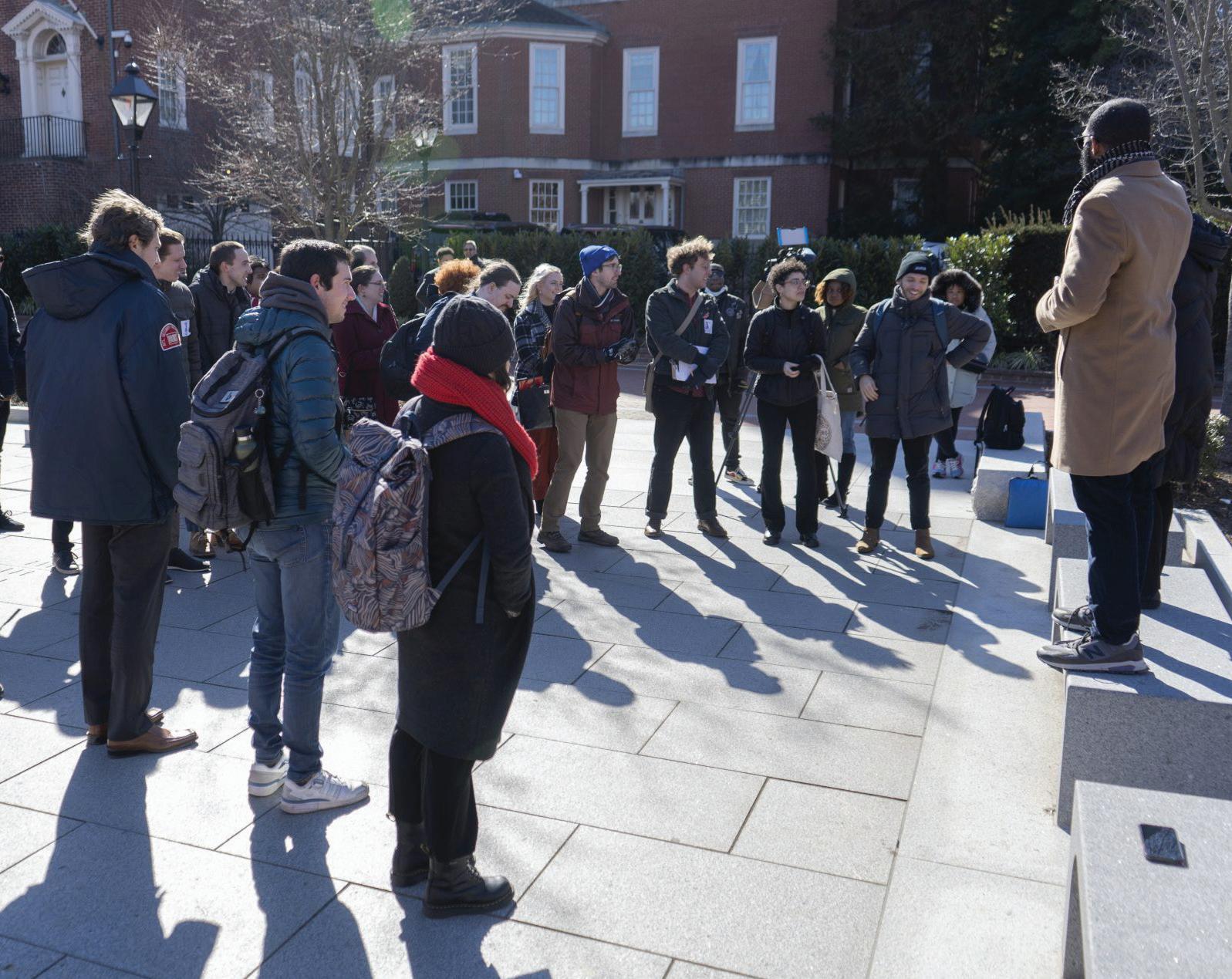
University of Maryland administrators are considering including a graduate student living-learning program in the redevelopment of the former Old Leonardtown community. The university currently offers several living-learning programs for undergraduate students, where students live with other students from the same academic program, such as College Park Scholars or University Honors, but none for graduate students.
There isn’t a set timeline for how the living-learning program would be implemented, university president Darryll Pines told The Diamondback. He said a potential living-learning program could increase graduate student retention rates and create an “enriching environment.”
Pines said living-learning communities could give graduate students who are Grand Challenges Grants awardees the chance to work on their challenges while living in a communal environment. The Grand Challenges Program supports research projects and changes on campus that address key societal issues such as climate change and gun violence. The university has awarded 50 grants to projects and individuals in the university community.
Graduate Student Government president Autumn Perkey said the idea of a living-learning program for graduate students couldn’t operate similarly to programs like College
By Sam Gauntt I Staff WriterPark Scholars because of the existing “constricted” curriculum for graduate programs.
“I think there’s the potential to create more stress rather than innovation as it would be additional requirements, possibly, depending on how they function,” said Perkey, a government and politics doctoral student. She emphasized that the plan for the program is not yet set in stone.
The former Old Leonardtown community has been demolished and will be replaced with a new approximately 750-bed complex for graduate students at this university, according to Ken Ulman, president of the Terrapin Development Company. He said the housing will be at below-market prices.
The project is a collaboration between this university and the Terrapin Development Company, according to Ulman. Perkey said a graduate student living-learning program should be optional for students, or come with a scholarship in addition to stipends graduate students receive.
Students who join a living-learning program should get an additional stipend for working on Grand Challenges or should get some form of price reduction for their housing, she said.
Ulman said the idea of a graduate student living-living program is “very unique. “There are not a lot of examples




of living learning communities for graduate students, and so there’s a lot of interest in that,” he said. “It’s in the early stages, but there’s a lot of momentum building.”
He added that there is time to figure out details on the project because graduate students won’t move into the complex for at least two and a half more years.
Jillian Andres Rothschild, the GSG’s legislative affairs vice president, said living-learning programs could be a good option for some graduate students. The communities could help graduate students make new friends and find a sense of community, she explained.
Rothschild, a government and politics doctoral student, said university administration should instead place their focus on affordable housing.
“The priority should be making sure there’s affordable housing without having to do extra commitments,” Rothschild said. Students shouldn’t have to do additional homework in order to live in affordable housing, she said.
Pines told The Diamondback that in addition to the living-learning programs, the university is still going to try to create affordable housing for graduate students.
“We’re gonna still try to find affordable housing,” Pines said. “But we believe [the program] will enhance the graduate student experience.”

Spring 2024
Feb 6
Application for Graduation
Feb 21
Nomination of Dissertation Committee Form
Mar 1
Nomination of Thesis Committee
Apr 16
Dissertation Forms
Apr 29
Thesis Forms
May 29
Master’s Programs/Post - Baccalaureate Certificates
Jun 17
Nomination of Dissertation Committee Form
July 12
Nomination of Thesis Committee
July 15
Application for Graduation
Jul 26
Dissertation Forms
Aug 9
Thesis Forms
Aug 23
Master’s Programs/Post-Baccalaureate Certificates
*subject to change if the semester GPA calculations are delayed

Fall 2024
Sep 9
Application for Graduation
Sep 23
Nomination of dissertation committee form
Oct 1
Nomination of Thesis Committee
Nov 8
Disseration and Report of Examiming Committee Form due
Dec 4
Thesis Form
Jan 7*
Master’s Programs/Post-Baccalaureate Certificates
Salisbury University offers a hybrid M.B.A. and an online M.B.A. through its AACSB internationally accredited Franklin P. Perdue School of Business.
Innovative. Affordable. Convenient.
Fast-paced program can be completed full- or part-time, giving students a competitive advantage in the job market.
Students excel through integrated simulations, leading-edge technology and virtual learning environments.
SAP-enhanced curriculum can lead directly to recruitment. Competitive tuition provides a high return on investment.
Students learn skills for globally diverse, team-focused and technologically oriented work environments.
Apply now!
Online and Hybrid Programs Information Sessions
Wednesday, March 13, 2024 • 5 p.m. via Zoom
Wednesday, April 10, 2024 • 5 p.m. via Zoom
Learn more:
410-548-3377
mba@salisbury.edu
info.salisbury.edu/onlineMBA



College Park buildings designated for senior living and affordable student housing could be prioritized for city tax credits after a College Park City Council discussion on Feb. 13.
The city’s revitalization tax credit program provides financial incentives for projects in two revitalization districts in the city, which encompass all commercial, mixed-use and industrial areas. The council discussed expanding tax credits in the city for affordable housing, blighted properties and other entities that could foster more economic development.
There are two levels of tax credit eligibility through the program. Developments must be located in revitalization districts to receive the credit. Level one projects are eligible for five years of tax credit. Properties eligible under this level can receive a maximum of 75 percent credit in their first year, and subsequently less credit for up to four years afterward.
Level two projects are eligible to receive a maximum tax credit of 60 percent for up to 15 years. The council evaluates whether a project is eligible for the tax credit program and which level it falls under.
Mayor Fazlul Kabir said the city is interested in focusing
By Eden Binder I Staff Writerthe program’s housing tax credits on affordable housing in particular, which would incentivize more affordable undergraduate and graduate student housing development.
“Many years ago we started supporting all the student housing on Route 1,” Kabir said. “But they’re not affordable [now].”
The council has previously issued revitalization tax credits to The Hotel at the University of Maryland and the Cambria Hotel, as well as The Varsity, Tempo, The Atworth and Aster apartment complexes.
Some housing developments that have previously earned tax credits through the revitalization tax program remain unaffordable to students, District 4 council member Maria Mackie said. Mackie added that she wants to secure promises of affordability from housing developments before giving them more tax credits.
City staff echoed similar sentiments about providing tax credits for graduate student housing developments — an idea the council was enthusiastic about.
Michael Williams, College Park’s economic development director, advocated for potential graduate student housing developments to clearly define affordability before proceeding with development.
“We’ve learned with whatever graduate student housing projects that came before you all that the definition of what the council was thinking was an affordable graduate student housing unit was not the same as what the developer came forward with,” Williams said.
Council members also proposed tax credits for other property types.
Mackie said the city should consider advancing a proposal that would provide tax credits to blighted properties, which would incentivize their development.
“I’ve always been an advocate of developing blighted properties rather than cutting down trees and making more cement in College Park,” she said.
District 3 council member John Rigg also said the tax credit program could encourage more senior housing development in the city.
More housing for seniors could increase the city’s yearround resident population, Rigg said.
“Purpose-built senior housing is something that’s missing in the city of College Park,” Rigg said. “We have some lower income senior housing, but we don’t have broad market senior housing.”
The University of Maryland SGA introduced a bill on Feb. 14 aiming to engage members in lobbying the Maryland General Assembly on legislation relevant to students.
Each year, the Student Government Association crafts a list of Maryland General Assembly legislation to lobby for focusing on issues important to students, according to SGA President Alexandra DeBus.
“All of these things are different facets that may affect the student experience at a university system Maryland college or university,” DeBus, a senior biochemistry major, said.
One of the most relevant general assembly bills to students is one that would grant collective bargaining rights to graduate students, among other groups, according to Chelsea Boyer, a sponsor of the SGA bill and a transfer representative.
For several years, graduate workers in the University System of Maryland have lobbied for a bill that would grant them collective bargaining rights, which would allow them to unionize.
Boyer, a junior communication major, said the Cameron Carden Act was another bill important to students. This
bill would allow students to withdraw from school under extenuating circumstances and receive reimbursement for tuition and fees.
Lucas Howarth, another sponsor of the SGA bill and the South Hill representative, also noted Maryland General Assembly bills focused on removing Maryland Correctional Enterprises from the list of preferred providers for certain state purchases or acquisitions.
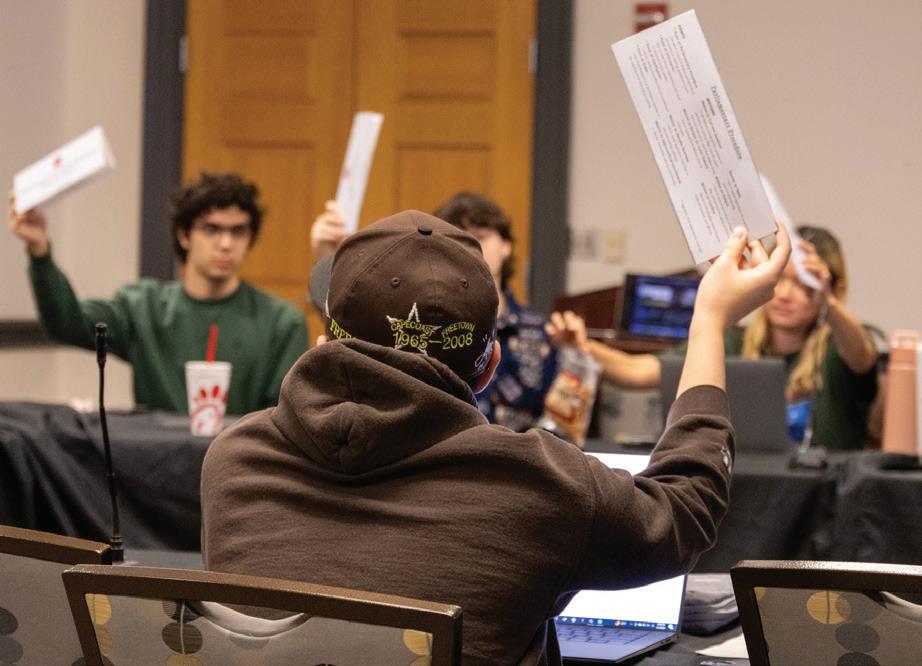
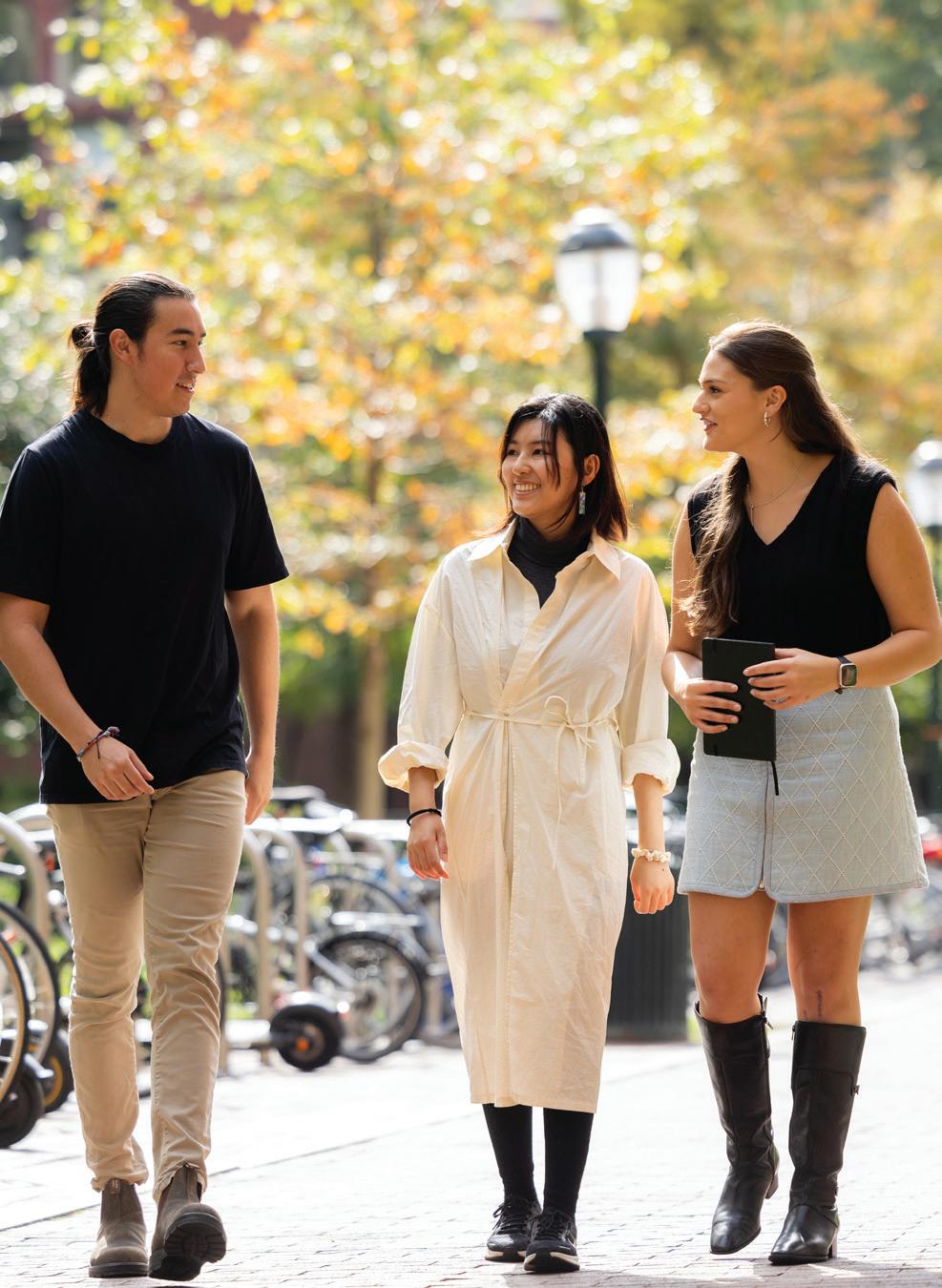
“We currently source pretty much all of the furniture in dorms and classrooms from prison labor, like private prison labor, and this bill would kind of put a damper on that,” Howarth, a junior government and politics major, said.
In 2020, students at this university started a petition that received more than 7,000 signatures, calling for the University System of Maryland to stop purchasing furniture built by people incarcerated in Maryland prisons, The Diamondback previously reported.
One of the ways the SGA plans on lobbying for these bills is “Ice Cream Day,” which will occur in March, according to Howarth. SGA members will hand out Maryland Dairy ice cream to Maryland General Assembly members while advocating for legislation.
“Anyone can come,” Boyer said. “It’s a really good event to connect [and] civically engage with the state government.”
SGA MEMBERS vote during a meeting held in Stamp on Feb. 7, 2024 (Sam cohen/The Diamondback)
The College of Liberal and Professional Studies offers a transformative, Ivy League education for graduate students seeking new paths and possibilities. You’ll experience hands-on learning, make global connections, and collaborate with distinguished faculty to help you reach your goals.
We offer graduate programs in:
• Applied Geosciences
• Applied Positive Psychology
• Behavioral and Decision Sciences
• Chemical Sciences
• Environmental Studies
• Liberal Arts
• Organizational Dynamics
• Public Administration
